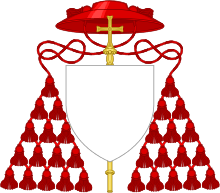Mieczysław Halka-Ledóchowski
Mieczysław Halka-Ledóchowski, (29 October 1822 – 22 July 1902) was born in Górki (near Sandomierz) in Russian controlled Congress Poland[1] to Count Josef Ledóchowski and Maria Zakrzewska. He was uncle to Saint Ursula Ledóchowska, the Blessed Maria Teresia (Theresa) Ledóchowska and Father Wlodimir Ledóchowski, General Superior of the Society of Jesus.
Mieczysław Halka-Ledóchowski | |
|---|---|
| Prefect of the Congregation for the Propagation of the Faith | |
| Church | Roman Catholic Church |
| Appointed | 26 January 1892 |
| Term ended | 22 July 1902 |
| Predecessor | Giovanni Simeoni |
| Successor | Girolamo Maria Gotti |
| Other posts |
|
| Orders | |
| Ordination | 13 July 1845 by Luigi Lambruschini |
| Consecration | 3 November 1861 by Camillo di Pietro |
| Created cardinal | 15 March 1875 by Pope Pius IX |
| Rank | Cardinal-Priest |
| Personal details | |
| Birth name | Mieczysław Halka-Ledóchowski |
| Born | 29 October 1822 Górki, Congress Poland |
| Died | 22 July 1902 (aged 79) Rome, Kingdom of Italy |
| Buried | Campo Verano (1902–27) Poznań Cathedral |
| Parents | Josef Ledóchowski Maria Rosalia Zakrzewska |
| Previous post |
|
| Alma mater | Pontifical Academy of Ecclesiastical Nobles Collegio Romano |
| Coat of arms |  |
| Styles of Mieczysław Ledóchowski | |
|---|---|
 | |
| Reference style | His Eminence |
| Spoken style | Your Eminence |
| Informal style | Cardinal |
| See | Poznań and Gniezno |
Early life
Born 29 October 1822, he was named after Mieszko I, the first Christian prince of Poland.[2] After studying at Radom, at the age of nineteen, he entered the seminary at Warsaw run by the Missionaries of St. Vincent de Paul. He then studied at the Gregorian University in Rome and entered the Jesuit Accademia dei Nobili Ecclesiastici to prepare to work in the diplomatic corps of the Holy See. Ledóchowski was ordained priest on 13 July 1845. He earned two doctorates, in theology and civil and canon law.[3]
Diplomatic career
Father Ledóchowski became domestic prelate of Pope Pius IX in 1846, and in 1847 auditor of the papal nunciature at Lisbon. In 1857 he became papal delegate in Bogota for an area that encompassed present-day Colombia, Venezuela, Ecuador, Peru and Bolivia. In 1861, he was named titular Archbishop of Thebes and papal nuncio at Brussels.[3]
Primate
After returning to Poland in 1864, he was named coadjutor with right of succession to Primate Leon Przyłuski, and two years later, upon Przyłuski's death, despite the opposition of the Prussian authorities, he was appointed archbishop of Gniezno and Archbishop of Poznań, (both cities then a part of the Prussian Province of Posen).[1]
In 1873, the Prussian government began the implementation of Kulturkampf policies against the influence of the Roman Catholic Church and in the aftermath forbade the use of Polish in instruction in the Province of Posen. Archbishop Ledóchowski urgently protested this order, and ultimately issued a circular ordering the religion teachers at higher educational institutes to use German in their teachings to the higher classes but to preserve Polish in their teachings to the lower classes.[1]
The religious instructors obediently followed the archbishop's order and were subsequently deposed by the Prussian government. Ledóchowski's refusal to cede control of the seminaries of Gniezno and Poznan to the Prussian authorities eventually led to their closure.[3] After repeated fines for outlawed activity, the government demanded Ledóchowski's resignation. The archbishop responded that no temporal court could deprive him of an office granted to him by God, and he was jailed in the Ostrów Wielkopolski prison in February 1874.[2]
In March 1875 the Pope appointed him as Cardinal. Ledóchowski was released and banished and thereafter ruled his see from Rome through secret emissaries. Towards the end of his life he began to have serious vision problems due to cataracts. He resigned in 1885. In 1892 he became Prefect of the Propaganda, an office which he held until his death,[2] on 22 July 1902.
See also
| Wikisource has the text of the 1911 Encyclopædia Britannica article Ledochowski, Miecislaus Johann. |
| Wikimedia Commons has media related to Mieczysław Halka Ledóchowski. |
References
- Ott, Michael. "Miecislas Halka Ledochowski." The Catholic Encyclopedia Vol. 9. New York: Robert Appleton Company, 1910. 16 Aug. 2015
- Staszewski, Rafał "Primate of the enslaved nation. Mieczyslaw Halka-Ledóchowski", Klimontow.net
- "Cardinal. Mieczyslaw Halka-Ledóchowski", Adonai.pl, Diocese of Warsaw-Praga
![]()